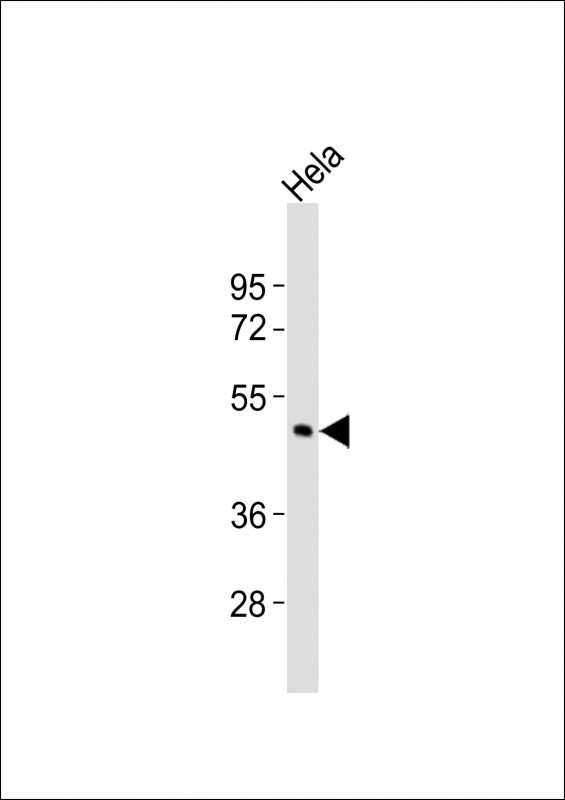
| WB | 1/2000 | Human,Mouse,Rat |
| IF | 咨询技术 | Human,Mouse,Rat |
| IHC | 咨询技术 | Human,Mouse,Rat |
| ICC | 技术咨询 | Human,Mouse,Rat |
| FCM | 咨询技术 | Human,Mouse,Rat |
| Elisa | 咨询技术 | Human,Mouse,Rat |
| Aliases | Carbohydrate sulfotransferase 4, 282-, Galactose/N-acetylglucosamine/N-acetylglucosamine 6-O-sulfotransferase 3, GST-3, High endothelial cells N-acetylglucosamine 6-O-sulfotransferase, HEC-GlcNAc6ST, L-selectin ligand sulfotransferase, LSST, N-acetylglucosamine 6-O-sulfotransferase 2, GlcNAc6ST-2, Gn6st-2, CHST4 |
| Entrez GeneID | 10164 |
| WB Predicted band size | 45.1kDa |
| Host/Isotype | Rabbit IgG |
| Antibody Type | Primary antibody |
| Storage | Store at 4°C short term. Aliquot and store at -20°C long term. Avoid freeze/thaw cycles. |
| Species Reactivity | Human |
| Immunogen | This CHST4 antibody is generated from a rabbit immunized with a KLH conjugated synthetic peptide between 357-390 amino acids from the C-terminal region of human CHST4. |
+ +
以下是关于CHST4抗体的参考文献示例(注:部分文献为示例性概括,建议通过学术数据库核实具体信息):
---
1. **文献名称**: "CHST4 is a novel biomarker for colorectal cancer progression and immune infiltration"
**作者**: Zhang Y. et al. (2022)
**摘要**: 研究通过CHST4抗体检测结直肠癌组织,发现CHST4高表达与肿瘤转移和不良预后显著相关,并提示其可能通过调节肿瘤微环境中免疫细胞浸润发挥作用。
2. **文献名称**: "Antibody-based functional blockade of CHST4 alters lymphocyte homing in vivo"
**作者**: Smith J.R. et al. (2019)
**摘要**: 利用CHST4特异性抗体进行体内实验,证实CHST4通过硫酸化修饰细胞表面黏附分子,调控淋巴细胞向次级淋巴器官的归巢过程。
3. **文献名称**: "Development of a high-affinity monoclonal antibody targeting CHST4 for ovarian cancer diagnostics"
**作者**: Lee S. et al. (2021)
**摘要**: 研究报道了一种新型CHST4单克隆抗体的开发,验证了其在卵巢癌组织中的高敏感性和特异性,并证明CHST4表达与化疗耐药性相关。
4. **文献名称**: "CHST4-mediated glycosylation in inflammatory bowel disease: Insights from antibody-based proteomic mapping"
**作者**: Brown K.L. et al. (2020)
**摘要**: 通过抗CHST4抗体进行蛋白质组学分析,揭示炎症性肠病患者的肠上皮细胞中CHST4表达异常升高,可能参与黏膜屏障功能失调。
---
建议通过PubMed或Web of Science以关键词“CHST4 antibody”“Carbohydrate sulfotransferase 4”进一步检索最新文献。
The CHST4 antibody targets the carbohydrate sulfotransferase 4 (CHST4), an enzyme encoded by the CHST4 gene. CHST4 belongs to the sulfotransferase family, which catalyzes the transfer of sulfate groups to carbohydrate moieties on glycoproteins and proteoglycans. Specifically, CHST4 mediates the sulfation of sialyl Lewis X (sLeX) epitopes on mucosal addressin cell adhesion molecule-1 (MAdCAM-1), a critical process for lymphocyte homing to gut-associated lymphoid tissues. This sulfation enhances the binding of MAdCAM-1 to integrin α4β7 on lymphocytes, facilitating immune cell recruitment during inflammation.
CHST4 is primarily expressed in endothelial cells of the gastrointestinal tract and plays a role in inflammatory bowel diseases (IBD), such as Crohn's disease and ulcerative colitis, where dysregulated lymphocyte trafficking contributes to pathogenesis. Antibodies against CHST4 are valuable research tools for studying its expression, localization, and function in immune regulation and inflammation. They are used in techniques like immunohistochemistry, Western blotting, and flow cytometry to investigate CHST4's involvement in disease mechanisms or potential therapeutic targets.
Recent studies also suggest CHST4's association with cancer progression, particularly in tumors exploiting sulfated glycans for metastasis. CHST4 antibodies may thus aid in exploring its role in tumor microenvironments or as a biomarker. However, its clinical relevance remains under investigation, requiring further validation of antibody specificity and functional studies to clarify its therapeutic or diagnostic potential.
×